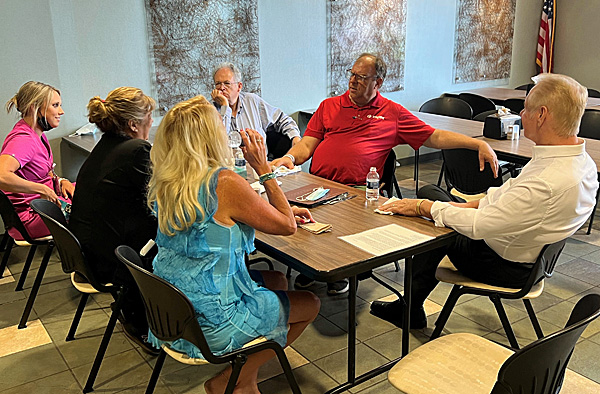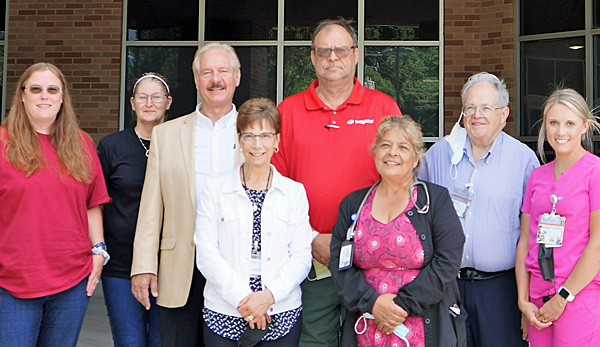 |
 |
| Randy Dickensheets meets with members of the PMH team who helped save his life following a heart attack. (L-R) Erin Bonnell, RN, emergency department manager; Brenda McIntosh, LPN; Ronald Kurzejka, MD, emergency room physician; Linda Webb, RN, chief nursing officer; Randy Dickensheets; Tanya Coe, RRT (respiratory therapist); Dave Broad, ER technician/security; and Shelby Davis, RN, ER nurse/education coordinator. |
“As soon as I saw the EKG, I knew Randy was having a heart attack,” said Ronald Kurzejka, MD, the ER physician on duty at the time. “And within five minutes of seeing those results, Randy’s heart stopped.”
PMH staff responded immediately, doing what they were trained to do. They performed CPR, shocked Dickensheet’s heart with a defibrillator, and administered medications through IVs to stimulate his heart function. The ER staff continued to perform CPR on Randy for 47 minutes before his heart started beating on its own.
The success was short-lived, however, as his heart would stop four more times before they were able to stabilize him.
“It all happened so fast,” said Dickensheets, “they knew they would have to transfer me quickly because the last thing I remember was them asking me which hospital I wanted to be flown to.”
Dr. K, as he is known at PMH, commended every staff member who helped save Dickensheet’s life that day, writing a personal letter to each of them, thanking and congratulating them for their work. “Every minute that CPR is delayed when someone’s heart has stopped decreases their chances of survival by 10 percent,” said Kurzejka. “The team at PMH is world class when it comes to training and preparation, and everyone knew right away what to do.”
Dickensheets grew up in rural Winamac and graduated in 1979 from Winamac Community High School. His father passed away from a heart attack when he was young. Randy knows that he is lucky to be alive. “I lost my dad when I was six, so my mom taught my siblings and me to be mindful of our diet – she even hid the salt from us. But she also taught us to be aware of the signs of a heart attack – so we could outlive our father and grandparents.”
“Being aware of his symptoms probably saved Randy’s life,” said Kurzejka.
Respond to the symptoms
According to the American Heart Association, more than 635,000 people have a new heart attack each year, and about 300,000 have a repeat heart attack. Symptoms can include chest pain, shortness of breath, nausea, and breaking out in a cold sweat. While women have similar symptoms to men, they may also experience jaw or back pain. Those with diabetes have heart attacks without chest pains about 25% of the time. Their only symptoms may be sweating, shortness of breath, or severe fatigue.
“If you start having these symptoms, especially a tightness in your chest and difficulty breathing, call 911 immediately,” says Kurzejka.
Dickensheets is thankful for the care he received at PMH. “People need to know that we can get high-quality healthcare in our community. And if they need to get you somewhere else, they can do it quickly. The staff knew immediately what to do to save my life. They kept me alive and stabilized me until the helicopter arrived. Once I was in the air, it was a 17-minute ride to Lafayette.”
He added, “when I was at Franciscan Health in Lafayette, the staff raved about Pulaski Memorial. They talked about how well trained and knowledgeable everyone is and how great they are to work with when someone needs transferring.”
Dr. K said diet and exercise play a vital role in heart health, but other factors are important. “Certainly, as an ER physician, I want people to eat better and move more, but genetics can also be a factor. That’s why it is important for people to see their primary care provider regularly. They can discuss diet changes that can help, they can discuss medications, whether a low-dose aspirin or a stronger prescription and they can also talk family history.”
Kurzejka added, “health care is a collaborative effort - not only between staff members, but between patients and providers. The more information we have, whether through testing or conversation, the better our chances of getting you healthy and feeling better.”
Dickensheets added that it’s critical for people not to delay care if needed, “I was having some unusual symptoms leading up to my heart attack, and I had planned to have a stress test. But I didn’t do anything about it, and that decision almost cost me my life.”
PMH offers a Heart Scan for anyone who thinks they may be at risk of having a heart attack. It is a quick, 30-minute CT scan that measures the calcium buildup in coronary arteries.
Knowing that score allows individuals to take measures to reduce the chances of having a heart attack. The cost is $49, and while a physician’s order isn’t required, PMH recommends talking with your primary care provider first. Results are then provided to patients and their providers so they can discuss them at their next visit. Patients can even see a picture of the buildup in their arteries.
Celebrating a positive outcome
Earlier this month, Dr. K had lunch for Dickensheets and the staff members who worked to save his life. “The ER is not always the easiest place to work,” said Kurzejka, “so it’s nice to be able to celebrate a positive outcome.”
“It’s weird to be part of a story and have such little memory of it,” said Dickensheets, “so I was thankful to have the opportunity to come back to meet and talk with the people who saved me.”
Next steps for Randy include cardiac rehabilitation at PMH. Cardiac Rehab is an outpatient therapy program designed to help individuals recover from a heart attack. The program includes exercise, education, and support to promote healthier lifestyles and improve heart function.
Dickensheets says he has a new look on life, “I am celebrating my 61st birthday because of these PMH aces and the staff in Lafayette. I think back to when my dad died and wonder if he had paid attention to his symptoms, or if he had the same access to the care that I had, would he have survived his heart attack? I was able to survive mine, and I will make the best of the time I have been given.”
Story provided by PMH







